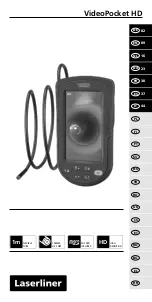
19
the main menu by repeatedly pushing the
EXIT
button. Pushing
at any time will
turn the colorimeter off.
The display may show the following messages:
Battery Status
More choices are available and can be viewed by scrolling up and/or down
through the display.
Header
Identifies the current menu and information on units and reagent systems
if applicable.
Footer
In the data logging mode the number of the data point is displayed and the
total number of data points in the memory will be shown. The footer also
shows current time and battery status.
TUBES AND CHAMBERS
The colorimeter uses one type of tube (Code 0290) for all test factors.
The handling of the tubes is of utmost importance. Tubes must be clean and free from
lint, fingerprints, dried spills and significant scratches, especially the central zone
between the bottom and the sample line.
Scratches, fingerprints and water droplets on the tube can cause stray light
interference leading to inaccurate results. Tubes that have been scratched in the light
zone through excessive use should be discarded and replaced with new ones.
Tubes should always be washed on the inside and outside with mild detergent prior to
use to remove dirt or fingerprints. The tubes should be allowed to air-dry in an inverted
position to prevent dust from entering the tubes. Dry tubes should be stored with the
caps on to prevent contamination.
After a tube has been filled and capped, it should be held by the cap and the outside
surface should be wiped with a clean, lint-free absorbent cloth until it is dry and
smudge-free. Handling the tube only by the cap will avoid problems from fingerprints.
Always set the clean tube aside on a clean surface that will not contaminate the tube.
It is imperative that the tubes and light chamber be clean and dry. The outside of the
tubes should be dried with a clean, lint-free cloth or disposable wipe before they are
placed in the meter chamber.
Tubes should be emptied and cleaned as soon as possible after reading a sample to
prevent deposition of particulates on the inside of the tubes.
Variability in the geometry of the glassware and technique is the predominate cause
of variability in results. Slight variations in wall thickness and the diameter of the tubes
may lead to slight variations in the test results. To eliminate this error the tubes should
be placed in the chamber with the same orientation each time.
Chambers which have been scratched through excessive use should be discarded and
replaced with a new one.
SAMPLE DILUTION TECHNIQUES
If a test result is out of the range of the meter, it must be diluted. The test should then
be repeated on the diluted sample. The following table gives quick reference guidelines
for dilutions of various proportions.






































